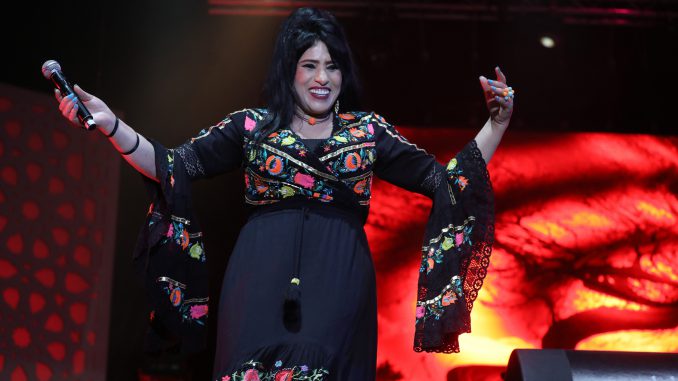
Najat Atabou is not just a popular artist to the Moroccans; she is the Diva of trends and popular folksongs. To this day, no artist can match her number of fans and love she gets from the Moroccan people. Not only because of her pure nature or that she emerges from the heart of the city of Khemisset, but because she represents a success and an inspiring story worthy to be classified as a dramatic film or series.
She was born to a poor family of many siblings. She had a passion for music and wanted to become a singer since she was young, but she will not dare express her desire in a conservative society where art and singing were considered as a disrespectful and an unaccustomed act far away from the traditional ethics.
Whenever she had the opportunity at a wedding, gathering or school ceremony, she would sing loudly and make her voice heard, until her voice was recorded on one occasion and the tape went viral without her knowledge. She decided to run away from the home when she began to receive death threats from her blood brothers upon discovering her passion and love for music.
She migrates to the city of Casablanca where she embarks on a new artistic adventure that resulted in the birth of a popular artist of high caliber today.
Attabou chose to direct her songs to the Moroccan audience who seem already familiar with classical Moroccan songs at that time, using a simple dialect they can understand. She succeeded in establishing a lyrical style of her own, completely different from the mainstream, especially when it comes to folk song. Her first album was “j’en ai marre” which broke the record at that time of the 80s by making an outstanding record of 500,000 sales. She followed it up with other successful songs such as “Shufi Ghiru”, “dmuii tabaak”, “SbaraYa Mii”, “Hadi kadba Bayna’’ and many more. Songs that successfully put her in the top front of the Moroccan list of female artists and made her the closest to the hearts of Moroccans who gave her the nickname “Lioness of the Atlas‘’.
As an Amazigh, she addressed the issues of women and their rights in most of her songs. Even though she sings using slangs and dialects, the powerful messages behind her words passed to the audience can never be ignored. She made an artistic feminist career with an effective rhythm to change the world.

Be the first to comment